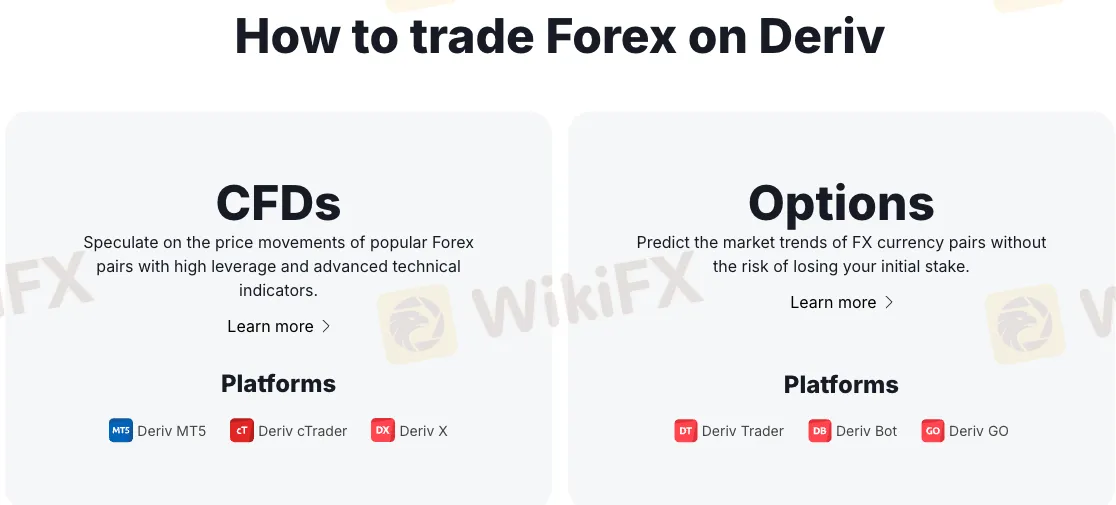简体中文
繁體中文
English
Pусский
日本語
ภาษาไทย
Tiếng Việt
Bahasa Indonesia
Español
हिन्दी
Filippiiniläinen
Français
Deutsch
Português
Türkçe
한국어
العربية
What Are Deriv MT5 and Platform Features?Deriv App and Markets Explained
Abstract:Explore the wide range of instruments Deriv offers, including forex, commodities, cryptocurrencies, stocks, and more. See which markets you can trade on Deriv.
In-Depth Overview of Deriv Trading Platforms
Deriv supports multiple advanced platforms to accommodate both beginner and professional traders:
- Deriv MT5 (DMT5): This multi-asset platform includes two sub-accounts:
- Derived Account for synthetic indices.
- Financial Account for forex, commodities, stocks, and cryptocurrencies.
It supports Expert Advisors (EAs), over 30 built-in indicators, and 9 timeframes.
- Deriv X: Built on TradingView infrastructure, Deriv X offers visual trading tools, customizable layouts, and in-chart execution. Ideal for technical traders.
- Deriv cTrader: Offers institutional-grade depth of market (DOM), level II pricing, and algorithmic trading via cAlgo. Copy-trading available.
- Deriv GO: Mobile-first trading for synthetic indices, forex, and crypto. It supports biometric login and trading alerts. Execution is swift, and users can toggle between demo/live accounts instantly.
- SmartTrader & Binary Bot: Simple interface for digital options traders. Binary Bot allows rule-based automation for options strategies.
What Can You Trade on Deriv?
Deriv provides a comprehensive market selection with both traditional and proprietary instruments:
- Forex: 50+ currency pairs including majors (EUR/USD, GBP/JPY), minors, and exotics. Variable spreads and leverage up to 1:1000.
- Synthetic Indices: These include Volatility, Crash/Boom, Jump, and DEX indices. Volatility is algorithmically generated, ensuring constant market conditions 24/7. Tactical Indices adjust based on RSI and volatility.
- Stocks & Indices: Trade Apple, Tesla, Meta, and top indices like Wall Street 30, S&P 500, FTSE 100. Offered as CFDs with flexible leverage.
- Cryptocurrencies: Over 20 tokens including BTC, ETH, DOGE, SOL, TRX. Deriv offers crypto-fiat and crypto-crypto pairings.
- Commodities: Trade spot metals (gold, silver), energy (oil, gas), and agricultural CFDs. Gold can be traded with micro lots.
- ETFs: Basket-based products across themes like tech, healthcare, and energy. Available on DMT5 under the Financial Account.
| Trading Instruments | Supported |
| Forex | ✔ |
| Commodities | ✔ |
| Indices | ✔ |
| Stocks | ✔ |
| Cryptocurrencies | ✔ |
| Options | ✔ |
| ETFs | ❌ |

- 24/7 Trading on Synthetics: Unmatched in the industry. Even during market holidays or weekends, traders have access to high-volatility instruments.
- Zero Commission: Most products carry no commission charges. Instead, Deriv profits via spreads.
- Multiplatform Strategy Execution: You can hedge forex trades on DMT5 while scalping synthetics on Deriv X simultaneously.
FAQs on Deriv Platform Interface & Market Access
Q1: Whats the difference between Deriv MT5 and Deriv X?
A1: MT5 is MetaQuotes platform with EA support. Deriv X is built on TradingView for manual, visual trading. Both serve different styles.
Q2: Does Deriv allow automated trading?
A2: Yes. MT5 supports Expert Advisors, and cTrader offers cAlgo for C# coding. Binary Bot allows logic-based automation.
Q3: Can I trade real stocks on Deriv?
A3: No. All stock trading on Deriv is CFD-based, meaning you speculate on price movements without owning the asset.
Q4: What mobile options are available?
A4: Deriv GO is the flagship app for mobile trading. MT5 and cTrader apps are also available from respective developers.
Q5: Are synthetic indices safe to trade?
A5: These are fully transparent, with constant volatility profiles. However, they are high-risk products and should be traded responsibly.
Q6: How are synthetic indices priced if not on real markets?
A6: Theyre generated via cryptographically secure algorithms audited for fairness and randomness. No real-world supply/demand affects pricing.
Disclaimer:
The views in this article only represent the author's personal views, and do not constitute investment advice on this platform. This platform does not guarantee the accuracy, completeness and timeliness of the information in the article, and will not be liable for any loss caused by the use of or reliance on the information in the article.
WikiFX Broker
Latest News
MFSA Warns of Digital Market Mining Scam: Alchemy Markets Clone
Alchemy Markets Launches Seamless TradingView Integration
Drawdown in Forex Trading
WikiFX Report: Five Forex Brokers with No Spread
Two Candle Patterns
EC Markets Expands with New Office in Mauritius
What WikiFX Found When It Looked Into CORSA FUTURES
European stocks set to rally at the open as U.S.-Japan trade deal boosts global market sentiment
Just be yourself' is bad advice, says expert—here's what successful people do instead
Opendoor leads meme stock redux on Wall Street with shares tripling in one week
Currency Calculator


